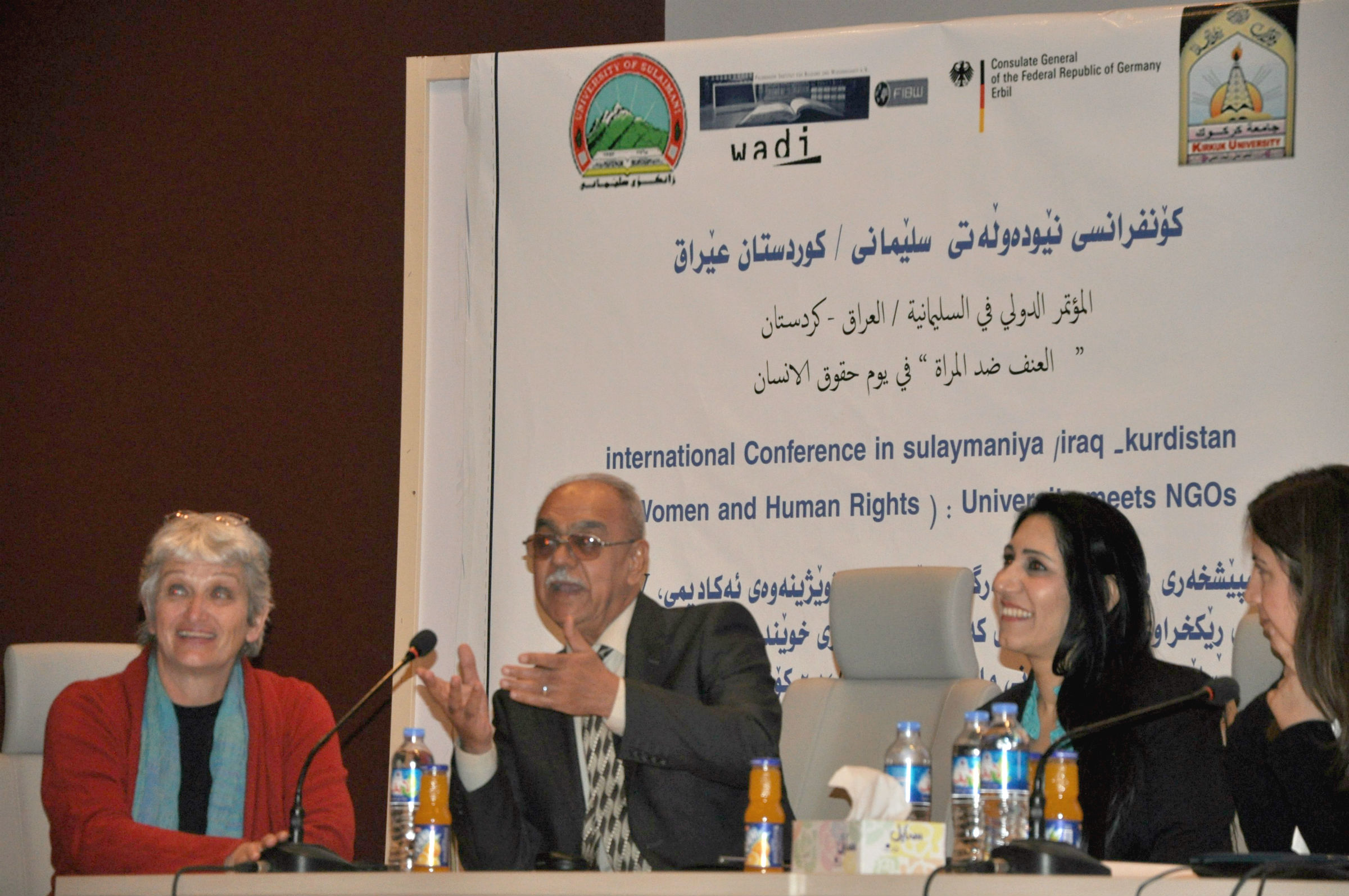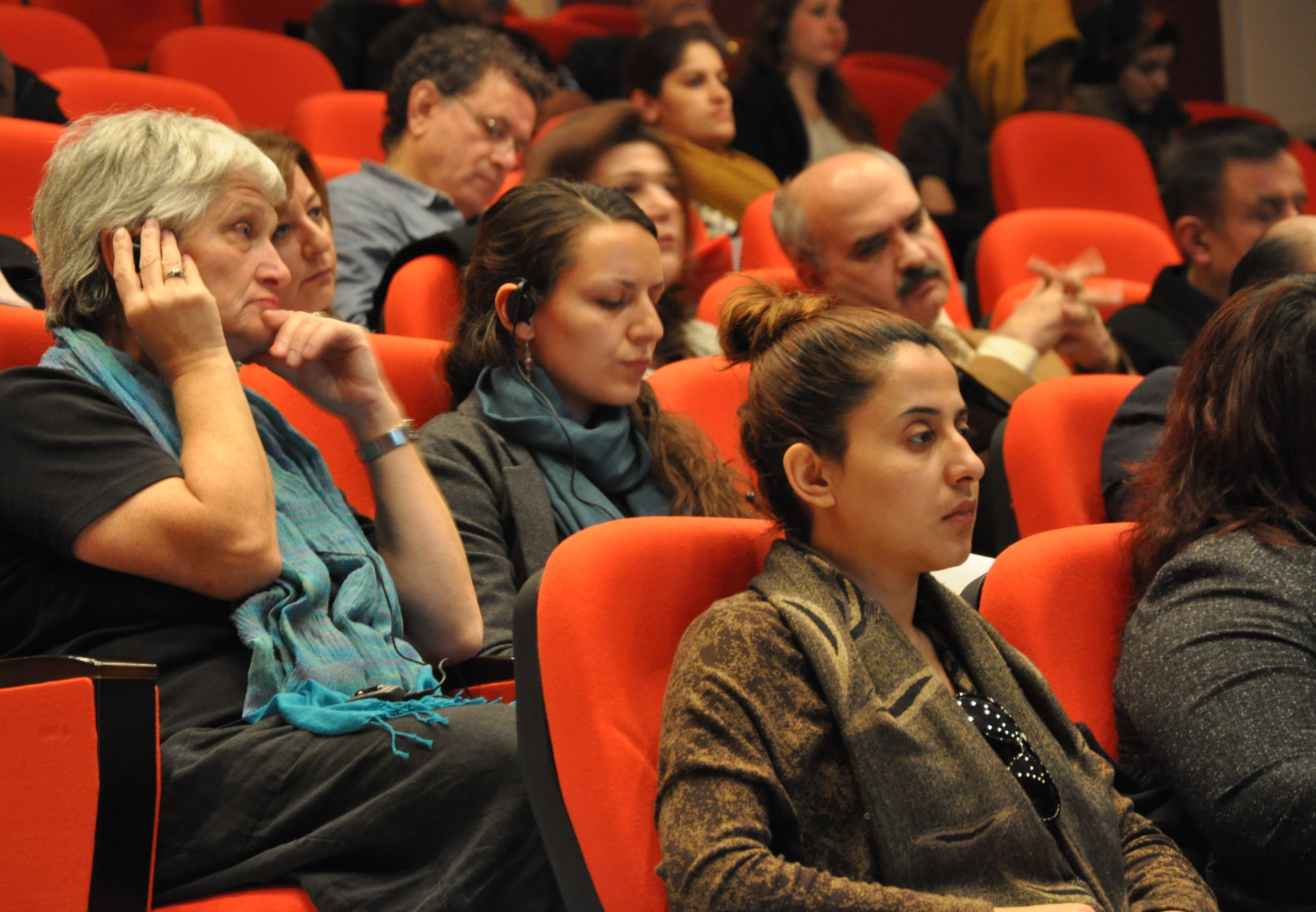On the International Human Rights Day, 10 December, the Felsberg Institute for Education and Academic Research (FIBW) together with WADI e.V. and the University of Kirkuk held an International Conference on Women and Human Rights in Iraq, hosted by the University of Suleymaniya in the Iraqi Kurdistan region. This event was funded and supported by the German Foreign Ministry and the German Consulate General in Arbil.
This conference, which took place against an on-going backdrop of continued war and on-going instability in Iraq, brought together speakers and attendees from throughout Iraq and the international community and was attended by over 150 participants, ranging from activists, aid workers and academics and to political officials and other concerned citizens. Various local TV stations and other media representatives were covering the event.
Before the first panel commenced, Prof. Salam al-Abadi of Baghdad University presented his study on violence against women in Iraq including various statistics he had compiled on the topic.
Female Genital Mutilation in a briader perspective
Female genital mutilation (FGM) was the theme of the first panel and consisted of Mr. Thomas von der Osten-Sacken, director of WADI, Dr. Maha Al-Sakban, a paediatrician based in southern Iraq who researches FGM in Arab areas of Iraq and Ms. Awezan Nouri, general director of the PANA organisation in Kirkuk and longtime anti-FGM activist. Dr. Al-Sakban and Ms. Nouri both highlighted significant challenges in addressing FGM in Iraq, with Dr. Al-Sabkan discussing her difficulties accessing data in the closed communities she was attempting to study and Ms. Nouri sharing her experience with conducting research in a hostile environment and lamenting that women’s issues in Kirkuk are often ignored as most attention is given to disputes related to oil and ethnic tensions. Mr. Osten-Sacken discussed WADI’s journey from their initial pioneering research on FGM in Iraq to current efforts to address the issue, explaining how initially they were met with a great suspicion when they tried to raise awareness on the rate of FGM in Iraqi Kurdistan. However, he stated that efforts to combat FGM now represent “a rare success story in the Middle East,” as Iraqi Kurdistan has passed the first law of its kind in the region outlawing FGM and Kurdistan is going through a general change in attitude regarding FGM, and now more and more people are considering it a cruel practice. While addressing the various obstacles in the fight against FGM, Mr. Osten-Sacken remained optimistic and spoke of the possibility of eliminating FGM in Iraqi Kurdistan in the next decade.
"Bring back our Girls" - The fate oy abducted Yezidis
The second panel discussed the presence of Islamic State (ISIS) terror organization in Iraq and the systematic violence they have practiced and continue to practice against Yezidi women. The panelists were Ms. Evar Ibrahim, Kurdistan MP and head of the Women’s Committee in the Kurdistan parliament, Ms. Nareen Shammo, investigative journalist and researcher currently focusing on the plight of the Yezidi people, and Mr. Falah Murad Khan, Iraqi project coordinator of WADI. All three panellists discussed the tragic situation of the Yezidi people and the various issues that demand attention in addressing their plight. Ms. Shammo, a Yezidi woman herself, provided important details on the magnitude of the humanitarian disaster that has affected the Yezidis. She gave criticism against those who failed prevent the calamity that has befallen the Yezidi people. Her presentation in particular was the cause of much controversy, as many conference attendees harshly criticised Ms. Shammo for discussing difficult topics such as slavery and rape, and pregnancies as a result of the rapes and sexual and physical abuse and some even reprimanded her for speaking on the failure of the security forces that led to the loss of the Yezidi areas, kidnapping and enslavement of local women, and displacement of hundreds of thousands of Yezidis. Many attendees also showed Ms. Shammo support, agreeing with her that the international community, along with the Iraqi Kurdish authorities, have failed the Yezidis.

From left to right: Birgit Svensson, Country Director Iraq Felsberg Institute, Prof. Fareed al-Qaisy, University of Kirkuk, Rezan Qaradaghy, Member of Parliament in Baghdad and Chnar Abdullah, head of Vocational Organizations at KDP Political Bureau in Erbil
The Batlle against Domestic Violence
The third and final panel addressed human trafficking and domestic violence. The panelists were Iraqi MP Ms. Rezan Qaradaghy, Dr. Jwan B. Bahaalddin, head of the Centre for Gender Studies at the University of Sulaymaniyah, Prof. Fareed H. al-Qaisy from the University of Kirkuk and Ms. Chnar A. Abdullah, head of Vocational Organizations with the KDP Political Bureau. Prof. al-Qaisy’s presentation offered information on the underlying causes of violence against women and was a much needed addition to a panel that sadly did not provide much in the area of conceptual frameworks around the topics of domestic violence and human trafficking.
This conference is an example of the efforts that are necessary in order to bring together likeminded people from various backgrounds to fight together against old and new forces of gender subjugation. As a community of activists we have to struggle to diminish the old forces of oppression, such as patriarchy, harmful gender norms supported by state institutions and religion, and modern forces of subjugation such as reactionary religious forces, which offer support for groups like ISIS. As a state of war persists in Iraq and more broadly throughout the region, it is imperative that awareness of various forms of gender-based violence is raised and more people in Iraq take interest to work to find solutions to decrease the burden on both women’s minds and bodies.
Quelle: Association for Crisis Assistance and Solidary Development Cooperation WADI. Website - http://en.wadi-online.de/
Download Conference Programm (PDF)
